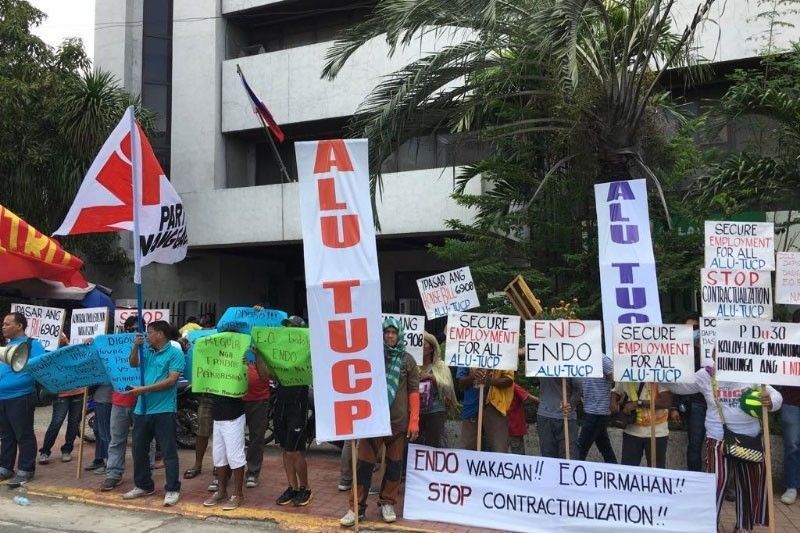TUCP: Pro-labor pivot would help pitch Philippines to investors

MANILA, Philippines — The Philippines has an opportunity under President Ferdinand "Bongbong" Marcos Jr. to include being pro-labor in its pitch for foreign investments, a representative of the Trade Union Congress of the Philippines told members of the House of Representatives this week.
The remarks were made to the House Committee on Labor and Employment last Wednesday as the panel held a hearing on measures to protect and to promote labor organizing into unions and workers' associations.
"In a situation of corporate impunity and given the last six years under the previous administration, it would be appropriate for a new administration that is into rebranding and pitching to the international community for foreign direct investments to signal that we are in conformity with the highest standards of the [International Labour Organization]," Luis Corral, TUCP vice president, said.
A high-level tripartite mission of the ILO visited the Philippines in January to meet with government representatives and to hear reports from labor unions and workers' groups.
Among the issued raised to the ILO mission were harassment and red-tagging of labor unions during the Duterte presidency, with representatives reporting attempts by the police and military to intimidate union members into disaffiliating.
Speaking during deliberations on a measure to lower the membership threshold for unions, Corral reminded attendees "in the spirit of cooperation and collaboration" that the government is expected to submit a report in June on its action on ILO's recommendations on policies and legislation.
Lower membership requirements
He noted that a proposal to lower the threshold to unionize to 10% of workers from 20% "is still too high," especially in plantations that may have up to 15,000 workers.
In the explanatory note to the Union Formation bill, Rep. Raymond Mendoza (TUCP party-list) said that a membership requirement of at least 20% is among the provisions in the Labor Code that the ILO has flagged as "prior restraint" on freedom of association.
The removal of the minimum membership from the Labor Code is among the recommendations that the ILO has been making since as early as 2019.
Elizabeth Doco, union representative of the Philippine Government Employees' Association, said the group had some reservations on lowering the threshold, especially since some workplaces are bigger than others.
"If we lower to 10%, imagine, there are some agencies that only have 300 workers. So that is just 30 people. For those with 100, that's just 10 people. It does not reflect the image of the whole workforce, but then if your agency is 1,000 employees, it might be better to sustain the 20%," she said.
Easier registration, even online
Lawyer Maria Consuelo Bacay, director of the Bureau of Labor Relations, said the DOLE would defer to "the spirit of tripartism and dialogues." She noted that the National Tripartite Industrial Peace Council had agreed in principle to a lower threshold but had yet to settle on a number.
She added, however, that the DOLE acknowledges that "the right to official recognition through legal registration is an essential facet of the right to organize" and that the department has been working to make union registration easier, and possible to do online.
"The registration process is a mere formality [so the DOLE can] provide assistance. We do not exercise discretionary powers to reject or to refuse registration as long as the minimal requirement have been complied with," she said.
According to a BLR briefer, labor unions only need to submit a notarized application former, the attendance sheet and minutes of its organizational meeting. In some cases, unions will also have to submit a certification of adoption of its constitution and by-laws and a financial report if the union has existed for at least one year.
"The requirements are not restrictive in nature," Bacay said. "The registration process is simple."
According to the Center for Trade Union and Human Rights, less than 8% of workers are in a union and an even smaller percentage have Collective Bargaining Agreements. CTUR representative Kamille Deligente said the numbers are "a manifestation of the barriers to workers' right to organize."
Lawyer Luke Espiritu of Bukluran ng Manggagawang Pilipino told the panel that workers should be given better avenues, like unions, to negotiate with their employers. "Workers do not ask for more than what is fair...and what they demand is not based on imaginary figures but on the profitability of their employers," he said in Filipino.
The committee moved to adopt the bill alongside another bill penalizing anti-union interference by employers and by the state.
The bills will still have to go through deliberation on the House floor. — Jonathan de Santos
- Latest
- Trending




























